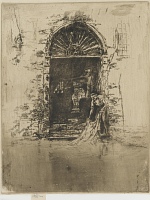The Dyer | ||
| Number: | 192 | |
| Date: | 1879/1880 | |
| Medium: | etching and drypoint | |
| Size: | 306 x 240 mm | |
| Signed: | butterfly at left | |
| Inscribed: | no | |
| Set/Publication: | no | |
| No. of States: | 10 | |
| Known impressions: | 18 | |
| Catalogues: | K.219; M.216; W.189 | |
| Impressions taken from this plate (18) | ||
KEYWORD
canal, counterproof, door, dyer, man, washing, worker.
TITLE
The sole variations on the title are as follows:
'The Dyer' (1883, Fine Art Society). 1
'The Dyer' (1886, Frederick Wedmore (1844-1921)). 2
'Dyers The Venice' (1890/1891, Whistler). 3
Although it is true that the scene is in Venice, the published title, 'The Dyer', is generally accepted.
'The Dyer' (1883, Fine Art Society). 1
'The Dyer' (1886, Frederick Wedmore (1844-1921)). 2
'Dyers The Venice' (1890/1891, Whistler). 3
Although it is true that the scene is in Venice, the published title, 'The Dyer', is generally accepted.
1: London FAS 1883 (cat. no. 11).
2: Wedmore 1886 A (cat. no. 189).
3: . List, [1890/1891], GUW #13236.
DESCRIPTION
A wide open doorway, with a semi-circular iron grille above it, is seen across a canal. To right of the doorway, high up on the wall, is a barred window. From the door, steps lead to the water, and on the right a dyer stands bending forward, holding some fabric in both hands and dipping it in the water. Behind him is a dark interior, lit by a single window, leading to a courtyard.
SITE
Venice, Italy. The exact position of the site has not been established.
DISCUSSION
Whistler frequently framed subjects showing working men and women within the doorway of their workplace or household. Another bent old man at work, for instance, is seen in The Two Doorways [221]. A similar composition, this time with a young girl dipping a cloth in the water, is seen in The Doorway [193]. Finally the dyer is less conspicuous but nevertheless an important part of the scene in a later etching, The Long House (The Dyers, Amsterdam) [453].
